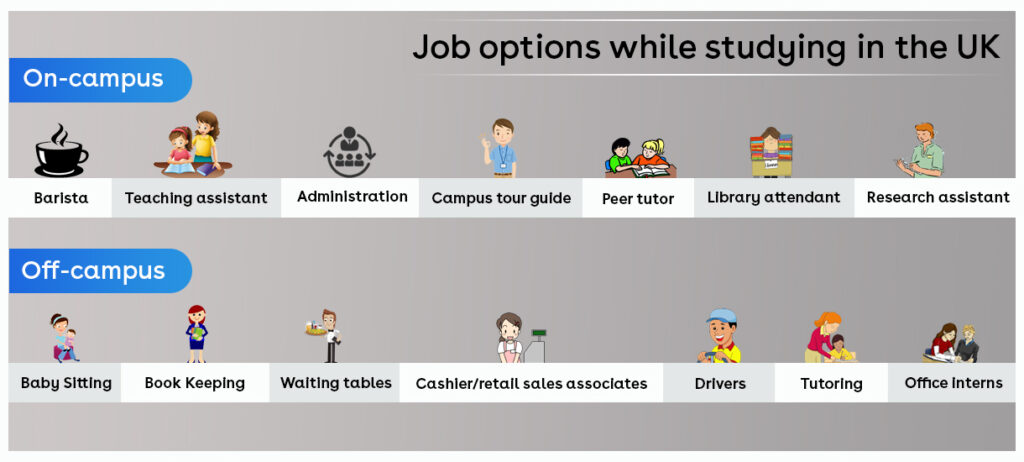Study In UK

Why Study In The United Kingdom
One of the most popular study destinations, the UK enjoys a proud tradition of education with universities rooting back to the 12th and 13th centuries. Known for its language, history, culture and innovation, the UK has an average student retention rate of 82%. with a comprehensive support systems in place for international students, studying in UK is definitely a life-changing experience.
Let’s know why Indian students prefer the UK as a top study destination
The United Kingdom (UK) is home to some of the world’s oldest universities and colleges having their roots in the 12th and 13th centuries. Coming from such strong legacy, education in the UK has become a benchmark for other countries.

Here are the top six reasons why studying in the UK is so popular with Indian students:
Academic Excellence
Universities in the UK have the best academic standards in the world. In fact, four out of the top 10 universities in the world are from the UK [QS World Ranking 2019] including the likes of Oxford and Cambridge. When studying in the UK, you will find that practical and utility-based knowledge is preferred over text-book learning. This will enable you to acquire critical thinking and analytical skills along with creative ability in your chosen discipline.
Quality Education
The Quality Assurance Agency (QAA) is an independent body in the UK that regularly assesses the education standards of all universities and colleges in the country. Besides checking their performances through audits and subject reviews, it and helps identify the best education practices and sends feedback for improvisation. These research standards are also examined by the UK higher education funding bodies, who publish their findings at regular intervals. This is ensures all students have access to the best quality of learning, research and teaching irrespective of the course they choose to pursue.
Shorter Duration Of Courses
Courses in the UK education system are shorter and more intensive than many other countries, which means you’ll graduate sooner, and without compromising on quality. While you can complete an undergraduate program in three years, you’ll be able to finish a graduate program in just one year. This not only saves your time, but also a chunk of money spent on tuition fees and living costs.
Work while You Learn
To manage your everyday living expenses along with your studies, you can work part-time for up to 20 hours a week during term time. You can even work full-time during your semester break. This will help you pay for your bills as well as gain industry experience in your own field of study as well.
Explore Europe While Studying
The UK is well connected to major European countries like France, Netherlands, and Belgium, being the closest at distances ranging from 300 – 1,000 miles. With the airport being functional 24 hours, you can explore different places while studying in the country.
Health Benefits For Students
As an internationals student, you’ll have access to free medical treatment while studying in the UK through the National Health Service (NHS). In order to avail this benefit, you will have to pay a small International Health Surcharge (IHS). Our counsellor can advise you about this detail.
Fun Facts About The United Kingdom
1 London has the largest library in the world.
2 The first billionaire author is from the UK– JK Rowling.
3 The Queen does not have a passport.
4 Over 11.5 billion sandwiches are consumed by the British every year.
5 Being dead in the Houses of Parliament is illegal in England.
6 Love Chicken tikka? So do the British – it has been voted as the country’s national dish by its citizens.
7 Buckingham Palace has its own police station.
8 The UK houses over a 100 universities.
9 What’s life without tea? The British consume 165 million cups of tea every day.
10 Over 300 other languages are spoken in London.
Education System In The UK
The UK is globally recognized for its teaching excellence. Let’s find out why.
The United Kingdom (UK) is reputed for its excellent quality of education, interactive teaching methodology, top ranking universities and great student satisfaction. Universities in the UK consistently rank in the world university rankings such as the QS World Rankings, Times Higher Education Ranking, and Academic Ranking of World Universities. Further, degrees earned from the country are globally recognised and preferred by employers all over the world.
Standing at the zenith of research and development, the UK offers students vast scope to build critical and analytical thinking. Here’s why an overview of the education system in the UK.
How Does The UK Education System Work
The responsibility of education in the UK is delegated to four jurisdictions – England, Northern Ireland, Wales and Scotland. All of these regions have different forms of education systems, qualifications and individual laws/regulations. The major differences can be found in general and secondary education resulting in each region having its own credit frameworks and qualifications.
Study Levels
The education system in the UK consists of four stages:
Primary education
Secondary education
Further education
Higher education
Qualifications Framework
A qualification framework is a principal national reference point that maintains academic standards in the higher education sect in any country. Two parallel frameworks run for higher education qualifications of UK degree-awarding bodies:
The Framework for Higher Education Qualifications of Degree Awarding Bodies in England, Wales and Northern Ireland (FHEQ)
The Framework for Qualifications of Higher Education Institutions in Scotland (FQHEIS)
Around 160 universities and colleges are allowed to award degrees in the UK.
Quality Assurance System
The unique factor of education system in the UK is its Quality Assurance Agency (QAA). It is an independent body that assesses and compares universities and colleges in the country through regular audits and reviews. It also identifies the best education practices and provides feedback for areas of improvement. This ensures that the students have access to the best quality of education.
All review reports are public, and can be accessed on the QAA website. However, do note that private institutions are not subjected to assessment by QAA.
Higher Education
Higher education in the UK mostly comprises bachelors, masters and doctoral degrees. As an international student, you may also transition to university level studies via pathway programs that generally include English language courses and foundation courses.
Undergraduate Courses
Undergraduate courses are designed to help students get exposure to a whole new world after school whilst providing a thorough understanding of a subject of interest. The UK offers a variety of courses in humanities, social science, art, design, business, technology, science and more!
Here’s an overview of the types of postgraduate courses offered in the UK:
Program Duration
Higher National Certificate (HNC) or Diploma (HND) 1 to 2 years
Certificates or Diplomas of Higher Education (Cert HE/Dip HE) 1 to 2 years
Foundation degrees (Fd A/FdSc) 6 months to 2 years
Degrees (such as BA, B.Sc, BEng) 3 years in England, Wales and Northern Ireland
4 years in Scotland
Sandwich degrees 4 years with a year in industry
Integrated courses (where masters is awarded as the first degree such as MEng) 4 years
Postgraduate Courses
Postgraduate courses are more specific and involve in-depth study. Most master’s degrees have duration of one year, which means you can be back in the workforce faster than your counterparts pursuing masters in other countries. There is a plethora of courses to choose from including niche courses that are highly valued in the industry.
Here’s an overview of the types of postgraduate courses offered in the UK:
Program Duration
Postgraduate certificates and diploma (PG Cert/PG Dip) 9 to 12 months
Taught Masters (such as MA, M.Sc., LLM, MBA, MRes) 1 year Full time
2 years Part time
Research Masters (such as MPhil, PhD, DPhil) 2-3 years
Pathway Programs
These are preparatory courses for seeking admission into universities through English Language learning programs or foundation-level courses. Pathway programs can help enter university-level studies in the country and help strengthen your language skills as well. These are offered by both universities and private institutions to help students who need extra assistance with English language to gain admission.
Financial Aid
Students who enroll for a course in the UK can get support in the form of scholarships, bursaries, grants, fellowships, and financial awards. These may be funded by the government, public/private organisations or institutions. Since a lot of students apply to these scholarships, we recommended you to apply in advance to beat competition and keep aware of the deadline to apply. Know more about the available grants, scholarships and bursaries available in the UK
Pedagogy In British Classrooms
The UK has a high reputation for its education, which is mostly the reason why so many Indian students come here to pursue higher studies. The best part about studying in the UK is the way education is imparted – it goes beyond textbook learning. You’ll be engaged in various activities such as workshops, seminars, tutorials and conferences at all times.
Teachers will expect you to be interactive in the classroom which will involve regular participation in group discussions, quizzes and debates. You’ll also be required to learn to work independently. If you see, education in the UK will eventually enhance your communication skills and help you build critical thought-process, creativity and analytical skills. This may be a little challenging initially but you’ll get the hang of it with constant support from your teachers and classmates.
Academic Year
The standard academic year in the UK begins around the month of September – October. The deadline for applications for courses commencing in September is generally in the preceding January of that year. Two other intakes available for programs in the UK are January and April, which are usually smaller than the September intake. Pathway programs may have additional dates to offer. Always check for the intakes available for your course of preference.
What are Study Abroad Intakes?
Know all about admissions and intakes abroad

Unlike a single intake in the Indian education system, colleges and universities abroad have various intakes in an academic year. Thus, when you apply for any of the universities in countries like Australia, Canada, Ireland, New Zealand or the UK and US, you can choose from more than one intake each year. For instance, if you missed the Spring intake this year, you can always try for the next intake in January instead of waiting for a complete one year.
What are The Different Kinds Of Intakes?
Most universities and colleges abroad offer two intakes- Fall and Spring. The fall intake usually starts in September (which ends in December) whereas as the Spring intakes begin in January (and ends in May). Certain universities and colleges also offer a minor intake in Summer that begins in April.
Intakes may vary on the basis of the program and institution. In certain institutions, intakes may also be referred to as terms or semesters. You must always check the official website of your preferred institution to confirm the available intake.
Wondering why these universities welcome students in two intakes?
Every university receives thousands of applications each year and it becomes difficult to accommodate a huge crowd in one intake
The universities keep the option available for spring intake considering any constraints due to which a student might not be able to take admission in the fall intake
Confused About Which Intake To Choose?
When choosing which intake to opt for, it is important to consider the availability of your preferred program, your academic records, entrance test scores, acceptance rates, job opportunities and your readiness on joining the course. We recommend you to start with your applications at least 10-12 months before the date of commencement of your program. For the Fall semester, ensure to have your score by April and for Spring, start no later than August.
Let's campare The Two Intakes:
Basis | Fall Intake | Spring Intake |
University | This is available in every university | This intake may or may not be available for some and you might need to check with the university |
Acceptance Rate | You might face severe competition as many students prefer this intake and chances of your application being accepted are minimal | You might not face much competition in this intake as not much students prefer to opt for it due to which acceptance rate of your applications is quite high |
Which Intake Do Indian Students Prefer?
Most Indian students opt for the September intake since it works in line with the completion of school or under-graduation in India. Students going for research programs often prefer the Fall/September intake since many professors choose to start their research in the beginning of the year and thus acquiring an internship or assistantship is easier in this intake than the Spring/January intake.
UK Student Visa Checklist

The UK Government provides an opportunity to all Indian students to study in the country but as a prerequisite, you’ll have to obtain a student visa first.
The visa you need will depend on your age and the type of study you wish to pursue in the UK. Here’s an overview* of the types of study visas and their application requirements:
*For detailed information, please visit the Gov.UK website
To be eligible for a Tier 4 student visa, you must:
Have an unconditional offer of a place on a course with a licensed Tier 4 sponsor
Be able to speak, read, write and understand English
Have enough money to support yourself and pay for your course.
Documents required for Tier 4 student visa
When applying for your Tier 4 visa, you will generally need:
A current passport or other valid travel documentation
Evidence of funds to provide your living expenses for the duration of your course
Confirmation of Acceptance for Studies (CAS) reference number and documents used to obtain CAS
Passport-sized colour photographs
Tuberculosis screening (if required)
Assessment documentation
Academic Technology Approval Scheme (ATAS) clearance certificate (if required)
Additional documents may also be needed if you are:
Not a citizen of the country you are applying from
Under 18 years of age
Have family (dependents)
*Please note that these are the basic requirements, speak with Future Overseas Studies counselor for a detailed list of documents
Detailed List of Documents Reqired For Visa Processing
If any of your supporting documents is not in English, you will need to have it translated. Each translated document must be dated, and include the translator’s name and signature and confirmation that it is an accurate translation of the original document.
Appling For Your Visa Online
You’ll have to apply for your student visa application online using the British Government’s official Gov.UK website. You can apply up to three months before your intended date of travel to the UK. Remember, your application date is the date when your application fee is paid.
How Can We Help With Visa Applications?
If you’re Future Overseas Studies student with an offer letter from any of our partner institutions in the UK, we can advise you on how to go about the entire process. We’ll make sure you are fully informed on the latest visa requirements and conditions; and also help you prepare the right documents for your submission.
Our team will direct you to the official websites and to authorised immigration representatives to ensure you have the latest applications forms and guidance. In fact, to reduce the hassle, we can also help with certifying, translating and couriering your documents.
Visa fee
As an applicant from outside the UK, you will have to pay £348 as your visa fee (do check the latest fee when applying here).
English language requirements
To gain your UK student visa, you’ll have to provide with an evidence of proficiency in the English language. This usually means passing a secure English language test to be able to prove your communication and correspondence skills.
IELTS for UKVI is an IELTS test approved for UK Visa and Immigration (UKVI) purposes. This applies to everyone coming from a non-English speaking country. While there is no change in the content, format or level of difficulty and scoring, IELTS for UKVI simply follows certain extra security protocols to ensure the authenticity of the test taker. The required minimum is usually IELTS with overall score 6.
You may also have to appear for a personal interview at the UK embassy or consulate.
Biometric residence permit
As part of your application, you must also obtain a biometric residence permit (BRP) from the UKVI. You will need to make an appointment with the UKVI to have your fingers and thumbs scanned and a digital photo taken of your face.
Job Opportunities For International Students In UK
Understand the job market and explore your prospects in the UK
What if we told you that you can support your living in the UK as an international student by working part-time! Not only this, working alongside your studies a great way to gain work experience in your field of study.
Students holding a Tier 4 (general) or a Tier 4 (child) visa can work up to 20 hours a week during their studies and full-time during holidays vacations if they: are studying at a publicly-funded higher education institution are studying a short-term study abroad program with an overseas higher education institution
are over 16 are studying a course at NQF level 6 (degree level) and above
It is important to note that you must not breach your immigration conditions as it is against the law in the UK. You cannot work if your passport sticker or identity card says ‘No Work’ or ‘Work prohibited’. Breaching the law in the UK can have disastrous consequences including deportation.
What are Your Options?

You can choose from a range of options when it comes to working as a student in the UK. If you’re lucky, you might just land up a job on the campus. Stay in touch with your campus career cell and check their notice board/online portal for regular updates on job openings.
Nearly all retail stores and eateries hire students on a regular basis. Check for openings at nearby departmental stores, cafes, multiplexes, bars, restaurants, hotels, hostels, and takeaway stores to find a suitable job.
If you’re a masters or a doctoral students or if you think you can teach something, you could be a tutor and even earn better than the regular barista jobs. Not everyone lands up an office job, but if you have prior knowledge and experience of social media, marketing, sales, web development, etc., you could be employed on a part-time basis as an intern.
How To Find Part-time Jobs In UK
The best way to find a job on campus is to stay connected with your uni’s placement or career centre. They regularly update their notice board or
On-campus work opportunities include administrative jobs, at the cafeteria or as teaching assistant
For off-campus jobs, look for vacancies online on portals like StudentJob, Employment 4 Student, Careers Group London, etc.
Look out for jobs in hospitality and retail industry, they are usually available in abundance
You can also work as a tutor if you are a student with any existing qualification or expertise
Working after you graduate
You will have to apply for a visa extension if you wish to stay and work in the UK after you finish your program.
The three most common visas available to international students are:
Start-up visa
Tier 2 (General)
Tier 5 (Temporary Worker)
Note that you’ll not be able for the popular Tier 1 (Graduate Entrepreneur) visa any more. You shall have to apply for Start-up visa.
Study Abroad Guide For Patents
All you need to know when sending your child to study abroad
Honestly, that’s one of the bravest decisions you’ll ever make, and yes, the most crucial one for your child. Studying abroad means your child will come back with international exposure and a widened mindset. As a parent, it is your responsibility to support your child in this decision and also gear up to be a part of the process.
why you need to do as a parent?
You need to know what motivates your child. As a parent, you should be an active part of their decision-making procedure to ensure they take the right calls in life.
Discuss goals openly
Sit down and understand why your child wants to go abroad – whether it is career-driven or personal. It is important to know what exactly your child seeks in life to be able to guide or support them.
Research extensively
As a parent it is your responsibility to research about the courses your child is interested in, the universities they have been talking about and the kind of lifestyle they would most thrive in.
consider your challenges
Reach out to friends and family whose children have gone abroad. Ask them about the challenges you are likely to face and figure out how to deal with them.
Seek detailed counseling
We offer free counselling sessions for students who wish to study abroad to further their career. You can come to our office and set up a free appointment. Bring your wish list so we can help guide your child through the journey.
Know how much you need to spend
Having an estimate of the costs involved in sending your kids abroad can help you make a better decision. However, it’s not just the tuition fee alone you should be calculating in your budget, there’re a lot more expenses involved when you plan to send your child to study abroad. Consider other expenses such as accommodation, food, health coverage, communication and travel as well!
Our guide on overall cost of studying can help ease your financial budgeting for your child’s stay abroad.
Make a detailed plan
Once you have an overview of what goes into sending your child abroad, make a plan. Consider all factors including course and university selection, finances, visa, etc.
Safeguard their health before they leave
Ensure to get your child’s general physical examination, dental check-up, and a gynaecologicalcheck-up (if applicable). Get them all shots and relevant boosters.
If your child wears glasses or contacts, get them a typed copy of their prescription. Help them with an extra pair of spectacles or contacts in case of emergency.
If there are specific medicines prescribed to your child, speak with their doctors who’ll help them with the name, potency, and purity of the medicine available in their destination. When helping your kids with packing, ensure to keep the medicines in the original container/packaging only along with the doctor’s prescription.
Travel safety is crucial!
Yes, it’s worrisome to send your child thousands of kilometres away, and that’s why it is important to ensure about their travel safety.
• You can’t forget travel insurance! Ensure your child is insured before they leave.
• Sign up for a safety program. For instance, the U.S. Department of State’s Smart Traveler Enrollment Program (STEP) keeps your child and you both updated with travel alerts and notifications while they are abroad. It also notifies the nearest U.S. Embassy or Consulate in case of an emergency.
• Research about the do’s and don’ts of the new destination
• Know about the local laws and international student rights
• Encourage your child to be a healthy traveller to avoid potential health risks owing to new food, water and climate.
• Stock them up with emergency supplies in case they take time to adjust to new food.
• Ensure they are vaccinated for common diseases in new destination.
• If possible, enrol them in a self-defence class before they depart for the new destination.
• Both parents and children should keep emergency numbers handy.
• Update your child on basic travel safety tips
Finally your child is abroad. Now what?
We know it was a hard goodbye, but keeping updated about your child’s well-being is not that tough. Here’s how you can keep in touch with them:
1. Decide how you will communicate
There are many mediums using which you can keep connected with your child – email, Skype, Facebook, Viber, WhatsApp, etc. See what’s most convenient to the both of you and install to start interacting. Please know that while you can use any of these platforms, do not use all of them. Give your child some space.
2. Pre-decide a time to talk
When you pre-decide when to talk, it sets the right expectations for both parents and children. You know when to talk and how often to keep in touch without cringing on their personal space. Usually the best time to decide this is when your child is settled in their program. This is when they can plan more confidently about their time schedules and plans.
In cases when your child is not able to respond to your calls or messages, don’t panic immediately. It could be due to a hectic schedule, low WiFi bandwidth or variance in time zones. It’s best to keep your timings flexible and not be over-demanding. This will help prevent any agitation if unable to cope with the difference in time zones.
3. Keep emergency contacts handy
Both parents and children should have some emergency contacts saved in phones at all times. For instance, keep handy the contact details of their college representatives or some close friends to reach out to if they are not reachable for a longer period of time.
4. Keep in touch with the authorities
Many institutions have forums where they involve parents in many activities, be a part of the same and volunteer for some responsibilities if possible. Keep in touch with the study program authorities, student counsellors, etc.
Further, as a parent you can also keep updated about your child’s in-country activity via email newsletters, Facebook pages, Twitter, or even instant photo and video updates on Snapchat. When selecting a program, be sure to check out their current social media platforms to get a feel for how to stay updated once your child is abroad.
5. They need some practical advice. Guide them
Guide your kids about practical survival skills to sustain abroad. Life overseas is going to completely different from India – educate your kids on money management and budgeting. Guide them on how to plan their monthly expenses so that they do not overspend.
While there are many Indian restaurants abroad, it’d be best to teach your kids some basic recipes for times when they can’t go out or order in. Unlike India, helps aren’t available that cheap abroad and your kids will have to take care of staple house chores on their own. Teach them how to manage these along with their coursework, job and student activities.
6. Emotional support matters
Sending your child abroad is a difficult decision and it is equally challenging for your child to move abroad. Help your child at every step of the way – they need your emotional support. Involve yourself in their decisions, encourage and motivate them for what they do. At times, your emotional support will help your child more than just the financial support.
7. React later, listen first
Your child has gone abroad and will experience many new things and adventures. They would also go through a range of emotions that they have never felt before. When they share about these with you, it is important for you to listen to them patiently. React only if necessary and give them advice subtly if you think it could sound harsh in some cases.
8. Spend quality time before leaving
Create some memories before they depart for the new destination. Go out, play games, spend some real quality time for them to cherish when abroad.
9. Pre-departure help/talk/sessions
Prepare your child for the big change so that they’re able to cope up with the cultural shock and are open to adjusting to a completely new environment. Better still; come to one of our pre-departure sessions wherein we brief them on life abroad, challenges and how to adjust in new destination.
How to send money abroad if your child needs?
The easiest way to transfer funds to your kids is by directly depositing into the bank account connected with his/her ATM card. Alternatively, you can either send international money orders available and cashed at post offices or purchase cashier’s check from the bank in the currency of the host country. Keep in mind that this usually has a service charge levied.
One of the most popular methods to send money overseas from India is through services like Western Union and MoneyGram. In case of a bank in the host city, you can make a wire transfer although this may take up to 48 to 72 hours.
MBA in UK

One of the most popular courses across the globe, a degree in business from a UK university helps students gain knowledge about planning, running and operations of an organization. Students get exposure to different aspects of the business world which includes areas such as marketing, finance, human resource and administration. While the initial stage involves an overview of the entire business world, at a more advanced stage, students can opt for specialization in one of the disciplines of business. MBA being the most sought after business program is offered by an array of UK universities. Some of the top institutions that provide MBA in UK include, University of Oxford, University of Warwick, University of Bath and University of St Andrews.
Advantage of pursuing a business course in UK
A globally recognized degree is offered
Universities at UK offer diploma, undergraduate, postgraduate and research programs in business.
MBA in UK stands atop the most popular business courses and is offered by some of the UK’s best universities.
Along with theoretical studies, business courses at UK universities also focus on case studies and practical exposure as they help students understand the subjects in a better way.
A degree in business from a UK university enhances the career options and earning potential of the students.
In some of the institutions students have to undergo an internship program as a part of the course curriculum.
Career opportunities
Business is a broad degree that encompasses a host of areas and there a variety of fields students can pursue upon completion of their diploma/degree. Students can enjoy a range of career options. These include:-
Accountancy
Advertising
Banking
Consultancy
Human resource Management
Marketing
Finance
Human Resource Management, etc.
Admission Requirements for pursuing Business in UK
To seek admission in a business course in UK, students must meet the below mentioned basic eligibility criteria:-
Undergraduate Diploma / Degree
Completion of secondary education studies equivalent to UK’s standards
Furnish school documents / transcripts and relevant certificates
Prove proficiency in English language i.e. obtain an admissible IELTS / TOEFL score
Post Graduate Degree / Diploma
A relevant 3-years bachelor’s degree obtained from a recognized university, equivalent to a UK degree
Minimum 1 year of work experience may be asked by some UK universities
Meet the criterion of proficiency in English language with a good score in IELTS / TOEFL exam
Some universities grant admission on the basis of GMAT score as well
Times Higher Education World University Rankings

Check how your university fares on the global map
We know it can be overwhelming to shortlist the right university from a pool of options available. Considering that you need to look at several indicators before settling on your final list, it is a good idea to refer the Times Education Higher Education (THE) World University Rankings of your preferred university or institution.
What is THE Ranking?
THE University Rankings is an annual publication of university rankings by the Times Higher Education magazine. It was initially published in collaboration with Quacquarellu Symonds (QS) and was known as the Times Higher Education – QS World University Rankings until 2009 when both decided to publish their own versions.
The methodology of QS remained the same whereas THE implemented a new ranking system with Thomson Reuters to develop their chart of top universities in the world. It is one of the three most popular rankings in the world along with QS World Ranking and Academic Ranking of World Universities.
Ranking Methodology
The influencers under this ranking include teaching (30%), research (30%), citation (30%), industry connections (2.5%), and international outlook (7.5%).
1396 | 92 | 1820 | 251,000 |
UNIVERSITIES | COUNTRIES & REGIONS | INSTITUTIONS | DATA POINTS |
Here’s a list of the top 10 universities in the world as per THE Ranking 2020:
Times Higher Education Ranking | ||||
S.No | Institution | Location | 2020 | 2019 |
1 | University of Oxford | UK | 1 | 1 |
2 | California Institute of Technology | USA | 2 | 5 |
3 | University of Cambridge | UK | 3 | 2 |
4 | Stanford University | USA | 4 | 3 |
5 | Massachusetts Institute of Technology | USA | 5 | 4 |
6 | Princeton University | USA | 6 | 7 |
7 | Harvard University | USA | 7 | 6 |
8 | Yale University | USA | 8 | 8 |
9 | University of Chicago | USA | 9 | 10 |
10 | Imperial College London | UK | 10 | 9 |
Interesting facts about THE Ranking 2020
• Pricewaterhouse Coopers (also known as PwC), a multinational professional services, audited this year’s ranking calculation, which makes the only ranking system to be subjected to independent scrutiny.
• The University of Oxford tops the chart in 2020 edition of the rankings for the 4th consecutive year
• Australia’s with two institutions – Queensland University of Technology and the University of Canberra – entered in the global top 200 for the first time as per the current methodology (post-2011) proving to be a remarkable year for the destination.

